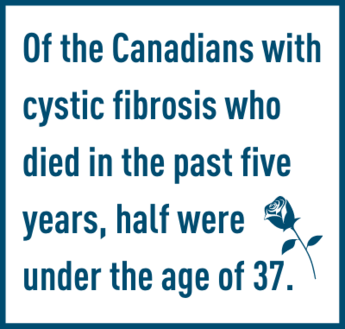Cystic Fibrosis Canada calls on provinces to list Trikafta immediately, as final recommendation from CADTH issued
Provinces pressed to save lives by following guidance from CF clinicians, and fund Trikafta now for all Canadians who can benefit
Cystic Fibrosis Canada is calling on all provinces to immediately list the cystic fibrosis (CF) drug Trikafta on public drug plans, as the Canadian Agency for Drugs and Technologies in Health (CADTH) issued a final recommendation on the drug and the pan-Canadian Pharmaceutical Alliance (pCPA) announced an agreement with Vertex, the manufacturer of Trikafta. Cystic Fibrosis Canada implores provinces to follow the care guidelines set by Canadian CF clinicians, which recommend access for all those who can benefit from the lifesaving drug, in contrast to the narrow CADTH recommendation, which would exclude access to 27% of eligible Canadians with cystic fibrosis, many of whom are youth.
CF clinicians, the experts in the disease, in partnership with Cystic Fibrosis Canada, have been pushing back on CADTH’s draft recommendation about who is eligible to receive the drug, noting that a prescribing criterion that requires someone to deteriorate to a 90% FEV1 or less (a measure of lung function) is short sighted and too restrictive. CF Canada is extremely disappointed that CADTH did not change its stance on its final recommendation despite this feedback, and the clear care guidelines developed by CF clinicians that CF Canada provided to the review body. If adopted by the provinces, this criterion will create an absurd situation in which patients, many of whom will be youth, will need to become demonstrably sicker to access Trikafta, a drug that might make them better. This restrictive criterion in CADTH's recommendation does not recognize the treatment approach developed over decades and ignores one of the most significant benefits Trikafta could provide to patients: preventing disease progression.
“CADTH’s recommendation regarding who can gain access to this life changing drug falls short of the guidance from the front-line experts, the cystic fibrosis clinicians across the country, who urged for wider prescribing criteria for this miracle drug. If adopted, the provinces will be effectively turning their backs on 27% of eligible Canadians, many of whom are children and youth. This number will dramatically increase when the drug is available for 6–11-year-olds. In fact, we estimate that 73% of these kids aged 6-11 could be denied access if this criterion is followed by the provinces. That is unacceptable.” said Dr. John Wallenburg, Chief Scientific Officer, Cystic Fibrosis Canada. “This is an anomaly. With one exception, no other jurisdiction in the world has imposed this condition. Fortunately, the recommendation is non-binding; the provinces have the power to change the trajectory of this disease and prevent needless suffering and irreparable damage. We are calling on them to follow the guidance of their CF physicians by listing Trikafta for all Canadians who can benefit.”
In a rare move, CADTH did make positive changes to its continuation criteria, or more simply, who can continue to receive the drug. Cystic Fibrosis Canada, CF clinicians and the community advocated strongly for CADTH’s draft continuation criteria to be expanded, as it was too restrictive and could have led to Canadians losing access to a drug that makes their lives significantly better. Cystic Fibrosis Canada is pleased to see that the recommendation for continuation is now more inclusive and reflective of the nature of the disease. CADTH has recognized that CF clinicians are the true experts on the disease and recommends that physicians provide the evidence of ongoing benefit for continuation. This aligns well with the care guidelines developed by the physicians themselves. This change will ensure people who are benefiting will be able to stay on the drug.
“I am part of the 27% of Canadians that won’t be able to take Trikafta,” said 13-year-old Cassidy Evans from Saskatchewan, who lives with cystic fibrosis. “I do almost three hours of physical therapy and take more than 20 pills every day. This drug could limit CF from attacking my body, but the government wants me to become sicker before I can get it. I don’t understand how they can do this. I am asking all Health Ministers to make Trikafta available for all Canadians who can benefit.”
Four provinces, including Ontario, Alberta, Prince Edward Island and Newfoundland and Labrador have committed to funding Trikafta. Cystic Fibrosis Canada calls on these provinces to forge ahead with these commitments and put Product Listing Agreements in place immediately and for the other provinces to follow their lead.
The pan-Canadian Pharmaceutical Alliance, a body that negotiates drug prices on behalf of the provinces, announced today that Trikafta has been added to the existing pricing agreements in follow-up to the positive regulatory and Health Technology Assessment recommendation by CADTH. This means that the provinces, which have indicated they understand the importance of moving quickly, now have everything they need to list the drug on provincial formularies.
In early September 2021, Quebec review body INESSS issued a recommendation to list Trikafta on the public drug plan, with similarly restrictive access criteria. Cystic Fibrosis Canada has urged the Health Minister of Quebec, Christian Dube, to reconsider the recommendation and trust his CF clinicians’ expertise and experience to prescribe the drug in accordance with their professional opinion. BC Pharmacare will make its non-binding recommendations on whether the government should pay for the drug in the coming weeks, after which the province will decide if it will fund the medication.
Members of the community and supporters are invited to join a Facebook Live for #TrikaftaToday on Friday, September 17 at 3:00 pm EST on the Cystic Fibrosis Canada Facebook page. Hosted in English, the event will bring the community together to discuss the recommendation from CADTH, and next steps to gaining access to life-changing cystic fibrosis medications.
For CF advocacy news, subscribe to CF Canada’s advocacy e-newsletter ‘The Advocacy Brief’.
For more information, please contact:
Cateryne Rhéaume, National Bilingual Communications and Marketing Associate
Tel: 581 998-5240
Email: crheaume@fibrosekystique.ca
Nicole Young, Director
Tel: (905) 317-5529
Email: nyoung@cysticfibrosis.ca




